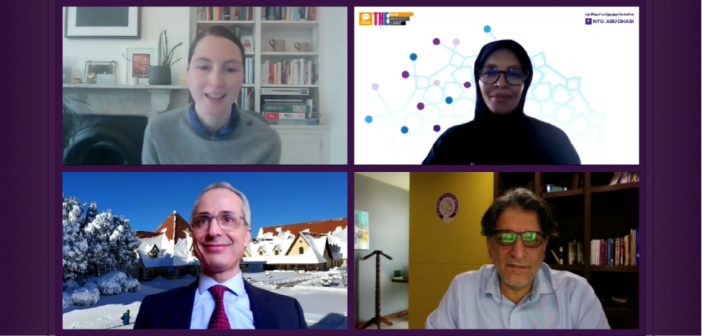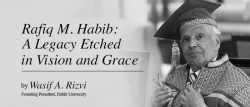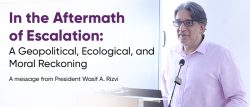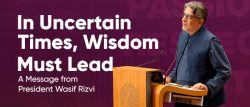Most university degrees are usually seen as a means to an end – either gainful employment or graduate studies. However, a liberal arts and sciences education, such as the one offered at Habib University, aims to create thoughtful individuals who are focused on lifelong learning which is crucial to developing an engaged workforce of the future.
This was suggested by Habib University President Mr. Wasif Rizvi while representing Pakistan at a regional education summit, Times Higher Education Universities Summit 2021, on Tuesday morning.
He was speaking at a session on “Liberal arts and employability: How does a liberal education develop talent to meet the demands of a global workforce?”
His co-panelists included Fatma Abdullah, the Senior Vice-provost of Strategy and Planning at the New York University (NYU) in Abu Dhabi, UAE, and Dr Amine Bensaid, President of Al Akhawayn University in Ifrane, Morocco.
Mr. Rizvi said that the concept of building a liberal arts and sciences university in a place like Pakistan came up in the wake of the War on Terror which claimed over 70,000 Pakistani lives.
“Most societal leaders, private citizens and those in the public sector were concerned about the lack of any positive impact coming out of their universities in any demonstrable way,” he said, adding that an argument emerged that Pakistani higher education is wrong-headed where it focused on a very narrow, vocational idea of what tertiary education should be.
“It has really failed societally,” he said.
Noting that the creation of Habib University was a natural calling, he said that they have created an environment that helps make students interested in becoming life-long learners.
He explained that the initiative of the only liberal arts college in Pakistan involves a thirst for knowledge. Habib’s pedagogy, he said, centers around the love for learning and wisdom.
“The challenge lies in thinking about how to engage young students into this rigor of learning and not as means to something – this is the attitudinal change which creates a life-long learner,” he explained.
Habib’s courses are rooted in ‘CPAC’ (Content, Pedagogy, Assessment and Community).
Of these, the first three form a formal part of evaluating the course, but the community aspect is the kind of interest generated amongst students without any credit or formal academic work attached to it but is something which counts towards their development as well-rounded graduates.
How do they react to the experience of taking the course? These are principal ways in ensuring that the pedagogy is not just a tool to convince employers, but thriving in a place like Habib University.
On advancing STEM education in a liberal arts setting, he said that for Habib University, the main reference point was the design-thinking beliefs and Stanford’s intervention which led to the creation of Habib University’s Dhanani School of Science and Engineering that allows for multidisciplinary input into problem-solving.
“We have large design studios – an integral part of pedagogy. We did not intellectually alienate ourselves,” he said, adding that the STEM faculty contributed greatly and even lead some of the courses and so on so that they are not looking at the liberal arts side of things from the fences and waiting for it to be over before they can descend with their chemistry and physics.
He said that business leaders, who have been exposed to the kind of education that is offered at Habib University, are very open to the idea of looking at liberal arts graduates favorably for employment. However, the entire apparatus of hiring human resources may not necessarily be compatible and there is a need to obtain the right kind of insights.
To a question on subsidizing liberal arts education, Mr. Rizvi pointed out that in Pakistan there is a big issue of accessibility to good quality higher education. Only a tiny fraction of students having studied in international systems of educations such as A’ levels and O’ levels enroll in good universities. The rest, which constitutes around 95% of all high school students who have studied from local education systems, find it nearly impossible to get into good colleges and universities.
The problem, Mr. Rizvi identified, was that private universities do not conceive themselves as community-owned institutions offering quality education hence students are their only source of revenue.
The answer is in presenting philanthropy as a supporter of higher education.
“We have been trying to influence philanthropy… We are on the track of growing a community of supporters and we have been successful in ensuring that Habib University becomes a properly, societally-owned institution.”
Mr. Rizvi emphasized that access to quality liberal arts education is only possible through the generosity of a growing community of patrons and supporters.
“We cannot cut corners with our faculty – we need to ensure that they are properly supported. The cost is in many ways justified but the question is: who pays for it? Are we recovering it from the students or are we mobilizing a larger social response?”
Fatma Abdullah was of the view that liberal arts education really engages students in a certain way where they can build on the skills that they are learning during their degrees. On employability, she was of the view that the UAE is moving towards becoming a knowledge-based economy and hence it is embracing both liberal arts graduates and the diversity of its students who come from around the world. What makes this easier, Abdullah said, was that many of the skills required by employers today are covered in the curriculum offered at liberal arts universities.
Dr Amine Bensaid, who heads Morocco’s sole liberal arts university, said that there has been an evolution in the mindset of employers over the past 25 odd years the university has functioned in North Africa, noting that many have adapted and learnt and are clear on the type of employees they want.
He suggested that students should also become acquainted with the job market and must be cognizant of what is required of them by certain employers.
Liberal arts education key to nurturing leaders in Pakistan
Share.




